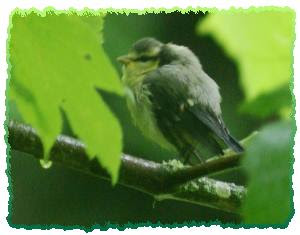 We then had an outbreak of Trichomonad parasite and lost about a dozen greenfinches. This disease mainly affects greenfinches and chaffinches. Despite regular cleaning of our feeding areas we dont appear to have prevented the disease. We have reported it to the RSPB and understand it is widespread at the moment and is causing a lot of Greenfinch mortalities.
We then had an outbreak of Trichomonad parasite and lost about a dozen greenfinches. This disease mainly affects greenfinches and chaffinches. Despite regular cleaning of our feeding areas we dont appear to have prevented the disease. We have reported it to the RSPB and understand it is widespread at the moment and is causing a lot of Greenfinch mortalities.
More advise can be found at
http://www.rspb.org.uk/advice/helpingb irds/health/sickbirds/greenfinches.asp The highlights of the summer were 2 days spent bird ringing with Geoff Sheppard, our local bird ringer and secretary of the West Galloway SOC (Scottish Ornithological Club). Geoff had ringed about 200 barn owl chicks in this area by the end of the summer. Most had fledged from nest boxes made and put up by him with the support from local farmers. He is one of our unsung local wildlife heroes. In celebration of his efforts I have made a short film from the pictures taken when we had the privilege of joining him on 2 trips this year. The film also shows the ringing of 6 kestrel chicks.
The highlights of the summer were 2 days spent bird ringing with Geoff Sheppard, our local bird ringer and secretary of the West Galloway SOC (Scottish Ornithological Club). Geoff had ringed about 200 barn owl chicks in this area by the end of the summer. Most had fledged from nest boxes made and put up by him with the support from local farmers. He is one of our unsung local wildlife heroes. In celebration of his efforts I have made a short film from the pictures taken when we had the privilege of joining him on 2 trips this year. The film also shows the ringing of 6 kestrel chicks.
The music is written composed and played by my son Mike http://www.mphmusic.co.uk

 Friday was beautiful here and as there was no Springwatch on ( yes of course we are watching it!) we went out for a coastal walk. We are still doing the Ringed Plover count for the BTO but didnt see any at all. We did see Stonechats, Herring Gull chicks and Fulmars though. We were just about to turn back when Pete shouted that he had found a chick on the beach. We watched it at a distance, but then it walked straight towards us, so I took lots of pictures and then we left it alone so its Mum could find it. I think it was an Oystercatcher, there are certainly plenty of them about here.
Friday was beautiful here and as there was no Springwatch on ( yes of course we are watching it!) we went out for a coastal walk. We are still doing the Ringed Plover count for the BTO but didnt see any at all. We did see Stonechats, Herring Gull chicks and Fulmars though. We were just about to turn back when Pete shouted that he had found a chick on the beach. We watched it at a distance, but then it walked straight towards us, so I took lots of pictures and then we left it alone so its Mum could find it. I think it was an Oystercatcher, there are certainly plenty of them about here.  It is pouring today and all the birds, especially the young ones are looking very bedraggled. Pete found a baby blutit by the burn this morning, dangerously close to being drowned. He picked it up and it hopped up his arm onto his shoulder and was then chrping to be fed. Pete quickly put it on a low branch, then at a distance, watched until its Mum came back and fed it.
It is pouring today and all the birds, especially the young ones are looking very bedraggled. Pete found a baby blutit by the burn this morning, dangerously close to being drowned. He picked it up and it hopped up his arm onto his shoulder and was then chrping to be fed. Pete quickly put it on a low branch, then at a distance, watched until its Mum came back and fed it.
 The pheasant, we have named him Hoppity, finds refuge and food in our garden daily and now comes when called. He looks a bit of a state as he has a limp, hence the name, and a battered tail.
The pheasant, we have named him Hoppity, finds refuge and food in our garden daily and now comes when called. He looks a bit of a state as he has a limp, hence the name, and a battered tail. We now have both male and female Great Spotted Woodpeckers visiting the garden daily.
We now have both male and female Great Spotted Woodpeckers visiting the garden daily.


